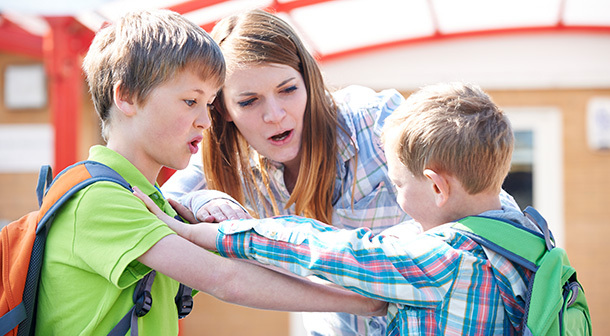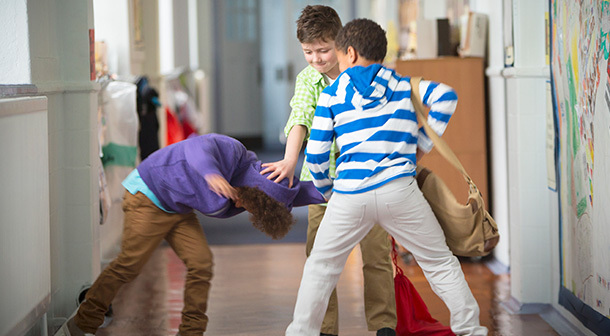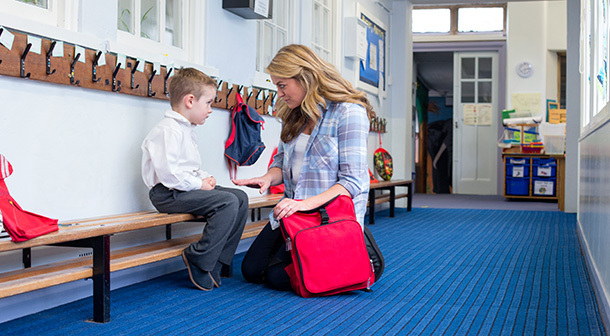Bad Behavior at School? Let Us Help
By GetParentingTips.com Staff
Read Time: 5 Minutes
It’s a call or email no parent wants: a teacher letting you know there are issues with your kid’s behavior. Whether it’s a small, one-time thing or a more serious issue, there are things you can do to handle child behavior problems.
Understanding Your Kid’s Behavior
The good news is that you don’t have to be a child behavior specialist to deal with bad behavior at school. The first step is to try to find out what is behind some of the most common behavior problems. It could be something happening at school, at home, or both. A child may act out because he (or she) wants attention or isn’t getting what he wants.
If your child is showing bad behavior at school, you may notice he does one or more of these things at home:
- Acts tired or grumpy after school.
- Complains about his teacher, schoolwork, or classmates.
- Refuses to do homework or household chores.
- Hides work or notes from his teacher.
Often, children with bad behavior problems at school haven’t learned how to control their emotions or have a specific challenge that has not yet been discovered by their parents or teachers. There are times when bad behavior problems at school could be caused by one or more of the following:
- ADHD, anxiety, and other behavioral disorders. If a doctor diagnoses your child with one of these conditions, it can be treated.
- Learning differences, developmental delays, or vision or hearing problems that may need treatment or require help in the classroom.
- Experiences such as losing a loved one or moving to a new school.
- Conflicts with kids, including bullying, that can cause him to withdraw, refuse to go to school, or show aggressive behavior.

Why a Kid’s Behavior Can Be an Issue at School
There can be many reasons for a child’s bad behavior at school but usually it falls into three areas:
- Breaking school rules.
- Having issues with other kids.
- Failing to do schoolwork.
At school, everyone must follow rules to keep order in the classroom. When students break rules, it can affect everyone and make it hard, if not impossible, for teachers to teach. A kid’s behavior that can get him in trouble for breaking school rules are:
- Talking too much during class.
- Walking around or not paying attention during a lesson.
- Bothering another student.
- Not following a teacher’s directions.
- Running in hallways.
- Skipping school or coming to class late.
Behaviors that involve other students could include:
- Hitting, pushing, or biting.
- Name-calling.
- Taking things from others.
- Bullying.
If your child is not finishing his assignments, then try to find out why. Is his homework too hard? Is he frustrated with the teacher? Is he having a hard time staying focused? Is another student making fun of him? Understanding the reasons can help you find a solution.

Need parenting help now?
The Texas Parent Helpline is available 24/7.
- Call 833-680-0611
- Chat with us
- Text 833-680-0611
How to Handle Behavior Problems at School
Below are three helpful tips for dealing with bad behavior problems at school.
Get the facts before you act.
When the school contacts you about your child misbehaving, it’s important to get the full story—both from the school and from your child—before you decide what to do.
Talk to everyone involved at school. The following questions should help you determine the consequences at home for bad behavior at school.
- When did the misbehavior happen?
- What led up to it?
- Has it happened before?
- How did the teacher/school handle your kid’s behavior when it happened?
- Is it clear that a school rule was broken?
- What will the teacher/school do to help prevent your kid’s behavior from happening again?
- Does the teacher/school have ideas on how you can work together to resolve the bad behavior?
Next, talk to your child so you can get the full story. Ask the same questions you asked the school staff and listen with an open mind. Even if you are upset, remind your child that you love him and want him to succeed at school.
When you have all the information, give yourself some time to think about the best way to respond.

Decide on consequences at home for bad behavior at school.
As a parent, you must teach your child that breaking the rules has consequences. That’s where discipline comes in. Explain that adults and kids must follow rules and when they break them, there are consequences. The purpose of discipline is to teach kids, not to punish them. Before you discipline your child, think about what is causing the misbehavior and set consequences you can keep. Being consistent is important for success.
If your child has already been punished at school, you will have to decide if and how you should respond at home. Child behavior specialists recommend considering the seriousness of the kid’s behavior at school. Did it happen just one time, like talking too much in class? In a case like this, talk to your child about what he can do to make sure it doesn’t happen again. Let him know you believe he can follow the rules and encourage him to do so. If it does happen again, the consequences at home for bad behavior could be something like losing a privilege for the day.
When the misbehavior is more serious, such as fighting with other kids or often being disruptive , you’ll want to work closely with your child’s teacher to try to resolve the issue. Make sure your child knows that misbehavior at school, just like misbehavior at home, won’t be allowed. Set consequences that you think will motivate him to change his actions.
Reward your kid’s behavior when it is good.
A behavior chart can be a great way to reward younger kids in elementary school. It is a way to give positive reinforcement when your child follows rules and directions. Put a sticker on the calendar when he has a good day at school. After a set number of positive rewards, celebrate together. Rewarding and praising your child for progress and good behavior is an important part of effective discipline. Kids of all ages need recognition when their behavior improves. Praise can go a long way in improving a child’s behavior at home and school.

Look for Warnings Signs
If you suspect that your child is struggling with schoolwork or having issues with another student or his teacher, encourage him to tell you about it. Sometimes a child needs to talk or cry to release all the emotions he is feeling. Reassure him that it’s okay to be upset and that you are always there to listen. Brainstorm together on possible solutions to help make the school situation better. Talk to the teacher about any concerns with classmates or schoolwork.

Rule Out Any Health Issues
Sometimes children have behavior issues that need to be addressed by a healthcare professional or a child behavior specialist. Talk to your child’s healthcare provider if you have concerns about your kid’s behavior. Aggressive behavior or ongoing misbehavior at school or home could mean something more serious. Examples include:
- No interest in participating in activities that he used to enjoy.
- Poor relationships with peers or teachers.
- Extreme anger or aggression.
- Always feeling sad, unhappy, or tired.
- Physical symptoms related to avoiding school, such as headaches or stomachaches.

Hang in There
Dealing with a child’s misbehavior at school is not easy. Work with your child’s school to help you better handle the problems and to stay informed. If the problem is more serious, talk to a child behavior specialist. Be consistent with discipline and consequences at home for bad behavior at school. Remember, discipline isn’t just about correcting what your child is doing wrong—it’s also about celebrating what he does right! Reinforcing a kid’s behavior when it is good is more likely to result a child making the right decisions.




